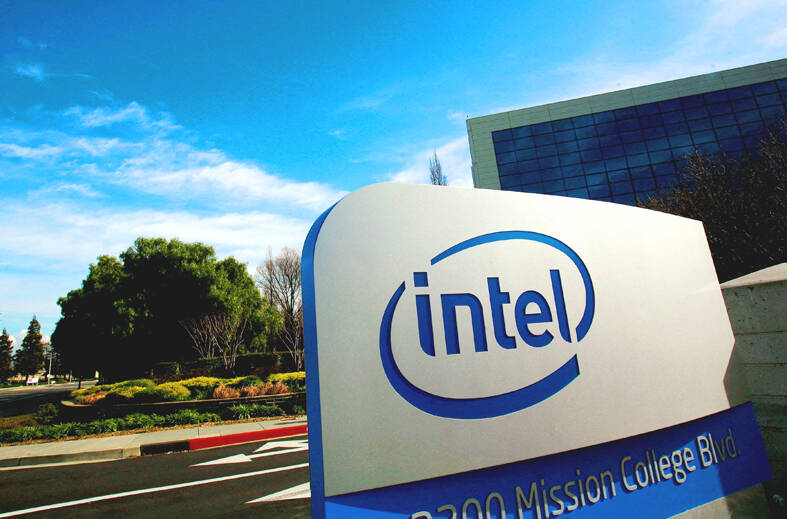Intel Corp shares on Thursday gained on a report that the company has tentatively agreed to a joint venture with Taiwan Semiconductor Manufacturing Co (TSMC, 台積電), a sign the beleaguered US chipmaker is moving ahead with a plan that has been highly anticipated by investors.
TSMC, the world’s largest contract chipmaker, is to take a 20 percent stake in the new company, the report said.
The shares on Thursday climbed more than 2 percent after the Information Web site reported the news, erasing a decline of more than 5 percent earlier in the session. The shares had been up about 10 percent this year through Wednesday, fueled in part by hopes that Intel would pursue such a move.

Photo: Reuters
Executives from both companies reached a preliminary agreement to form a joint venture that would run Intel’s manufacturing plants, the Information reported.
Intel and other US chipmakers would hold the majority of shares in the initiative, which would include at least some of the US company’s factories, said the news site, which cited unnamed people familiar with the situation.
TSMC yesterday said it has “no comment on market rumors” when responding to an inquiry about the matter from the Taipei Times.
Premier Cho Jung-tai (卓榮泰) yesterday downplayed the potential combination between TSMC and Intel when he was asked about whether the TSMC-Intel deal would be one of the nation’s bargaining chips in its negotiations to reduce the 32 percent “reciprocal” tariff imposed on Taiwanese imports to the US.
“The principle is that for any ongoing cooperation or negotiations, we will put the country’s interest first,” Cho said. “As for new speculation or news, we have not received any reports yet.”
United Microelectronics Co (UMC, 聯電), Taiwan’s second-largest contract chipmaker, was reportedly in merger talks with US chipmaker GlobalFoundries Inc in another push by Washington to secure more less-advanced chip capacity in the US.
UMC denied the report.
Bloomberg News in February reported that TSMC and Intel were discussing the idea at the request of the administration of US President Donald Trump. The scenario is meant to help address Intel’s deteriorating financial state, which has forced the company to cut thousands of jobs and curb its expansion plans.
If the plan goes ahead, it would be a dramatic early step for Intel chief executive officer Lip-Bu Tan (陳立武), who took the job last month.
During an appearance at the Intel Vision conference in Las Vegas on Monday, he said the chipmaker would spin off assets that are not central to its mission.
TSMC has already been stepping up its investments in the US. TSMC chief executive officer C.C. Wei (魏哲家) joined Trump at an event last month and pledged to spend an additional US$100 billion on chipmaking plants in the US.
Additional reporting by Lisa Wang

MULTIFACETED: A task force has analyzed possible scenarios and created responses to assist domestic industries in dealing with US tariffs, the economics minister said The Executive Yuan is tomorrow to announce countermeasures to US President Donald Trump’s planned reciprocal tariffs, although the details of the plan would not be made public until Monday next week, Minister of Economic Affairs J.W. Kuo (郭智輝) said yesterday. The Cabinet established an economic and trade task force in November last year to deal with US trade and tariff related issues, Kuo told reporters outside the legislature in Taipei. The task force has been analyzing and evaluating all kinds of scenarios to identify suitable responses and determine how best to assist domestic industries in managing the effects of Trump’s tariffs, he

TIGHT-LIPPED: UMC said it had no merger plans at the moment, after Nikkei Asia reported that the firm and GlobalFoundries were considering restarting merger talks United Microelectronics Corp (UMC, 聯電), the world’s No. 4 contract chipmaker, yesterday launched a new US$5 billion 12-inch chip factory in Singapore as part of its latest effort to diversify its manufacturing footprint amid growing geopolitical risks. The new factory, adjacent to UMC’s existing Singapore fab in the Pasir Res Wafer Fab Park, is scheduled to enter volume production next year, utilizing mature 22-nanometer and 28-nanometer process technologies, UMC said in a statement. The company plans to invest US$5 billion during the first phase of the new fab, which would have an installed capacity of 30,000 12-inch wafers per month, it said. The

Taiwan’s official purchasing managers’ index (PMI) last month rose 0.2 percentage points to 54.2, in a second consecutive month of expansion, thanks to front-loading demand intended to avoid potential US tariff hikes, the Chung-Hua Institution for Economic Research (CIER, 中華經濟研究院) said yesterday. While short-term demand appeared robust, uncertainties rose due to US President Donald Trump’s unpredictable trade policy, CIER president Lien Hsien-ming (連賢明) told a news conference in Taipei. Taiwan’s economy this year would be characterized by high-level fluctuations and the volatility would be wilder than most expect, Lien said Demand for electronics, particularly semiconductors, continues to benefit from US technology giants’ effort

‘SWASTICAR’: Tesla CEO Elon Musk’s close association with Donald Trump has prompted opponents to brand him a ‘Nazi’ and resulted in a dramatic drop in sales Demonstrators descended on Tesla Inc dealerships across the US, and in Europe and Canada on Saturday to protest company chief Elon Musk, who has amassed extraordinary power as a top adviser to US President Donald Trump. Waving signs with messages such as “Musk is stealing our money” and “Reclaim our country,” the protests largely took place peacefully following fiery episodes of vandalism on Tesla vehicles, dealerships and other facilities in recent weeks that US officials have denounced as terrorism. Hundreds rallied on Saturday outside the Tesla dealership in Manhattan. Some blasted Musk, the world’s richest man, while others demanded the shuttering of his